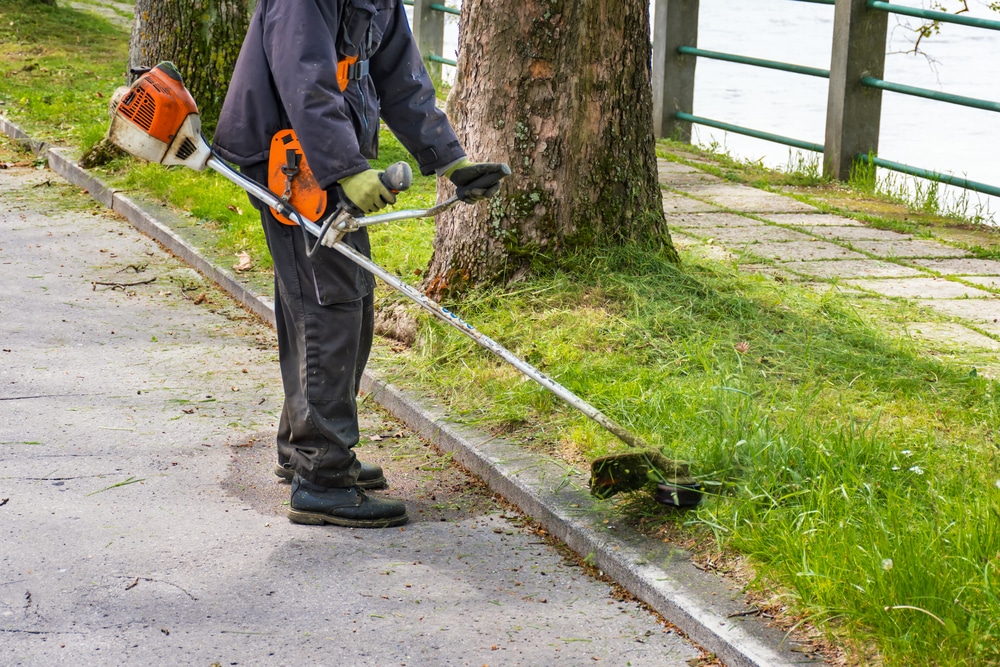Last Updated on
Have you ever been stuck between the decision of whether to buy a grass trimmer or brush cutter for your garden? It can be difficult to decide which one is best suited for your needs. In this blog post, we’ll compare and contrast the differences between these two tools, so you can make an informed choice on which will work best in your home and garden environment. We’ll look at both the pros & cons of each tool – from power source options through to ease-of-use – as well as explore what type of job they are most suitable for doing in order to help you pick out that perfect grass trimmer vs brush cutter solution.
Table of Contents:
- Grass Trimmer Pros and Con
- Brush Cutter Pros and Cons
- FAQs in Relation to Grass Trimmer vs Brush Cutter
- Conclusion
Grass Trimmer Pros and Con
Grass trimmers are a great tool for keeping your lawn looking neat and tidy. They can help you keep the edges of your grass neat, trim away weeds, and even shape shrubs and hedges. But like any garden tool, there are pros and cons to using a grass trimmer.
Pros:
Easy to Use:
Grass trimmers are relatively easy to use compared to other gardening tools such as hedge clippers or chainsaws. All you need is some basic knowledge of how they work and you’ll be able to get started quickly without too much hassle.
Versatile:
Grass trimmers can be used for more than just trimming grass – they can also be used on hedges, shrubs, bushes, trees and more. This makes them incredibly versatile when it comes to maintaining your garden or outdoor space in general.
Lightweight and Portable:
Most modern grass trimmers are lightweight which makes them easy to carry around with you while working in the garden or yard – this means less strain on your back from lugging heavy equipment around. Additionally, many models come with wheels so that they can easily be moved from one area of the yard/garden to another without having to lift them up every time (which is especially useful if you have a large property).
Con:
Noise Pollution:
Unfortunately due to their motorized nature most grass trimmers produce quite a bit of noise pollution which may not be ideal if you live in an area where noise levels must remain low (e.g., near schools or hospitals). It’s important that users take care when operating these machines so as not to disturb those living nearby unnecessarily.
When it comes to trimming your lawn, grass trimmers offer a range of advantages, from convenience and portability to cost-effectiveness. However, they may not be suitable for all types of terrain or heavy-duty jobs. To find out if a brush cutter might be more suited to your needs, let’s take a look at its pros and cons next.
Brush Cutter Pros and Cons
Brush cutters are a great tool for garden maintenance, but they come with their own set of pros and cons. Let’s take a look at what these are.
Pros:

1. A brush cutter is more powerful than a grass trimmer, so it can handle thicker vegetation like small shrubs and trees with ease. It also has the ability to cut through tougher materials such as roots and vines that would be difficult or impossible to trim with just a grass trimmer.
2. Brush cutters have larger cutting blades which makes them faster and more efficient when dealing with large areas of dense vegetation or thick undergrowth in your garden or yard. They also have adjustable speeds so you can tailor the speed to suit the job at hand – from light trimming jobs to heavy-duty clearing work on overgrown gardens.
3. Brush cutters are easier to manoeuvre around tight corners due to their smaller size compared to other types of lawnmowers or hedge trimmers, making them ideal for use in confined spaces such as backyards or narrow pathways between buildings where there isn’t much room for larger machinery.
4. Brush cutters require less maintenance than other tools since they don’t need regular sharpening like some other gardening tools do; all you need is an occasional oil change every few months depending on how often you use it.
Cons:
1. One downside of using a brush cutter is that it produces loud noise levels while operating which may not be suitable if you live in close proximity to neighbours who might find this annoying (it’s important always check local regulations before using one). Additionally, due to its power output, brush cutters should only be used by adults who understand how dangerous they can be if handled incorrectly – children should never operate one without adult supervision.
2. Another potential downside of using a brush cutter is that it may be more expensive than a grass trimmer due to its increased power output and larger blades. However, this initial investment could pay off in the long run as they tend to last longer than other gardening tools thanks to their durable construction material (usually metal) which is better able to resist wear and tear compared with plastic alternatives found on cheaper models.
Overall, brush cutters offer a great deal of convenience and power for tackling tougher garden jobs. However, they can also be quite dangerous to use if not handled properly. Now that we’ve discussed the pros and cons of using a brush cutter, let’s take a look at which type is best suited for your specific needs.
FAQs in Relation to Grass Trimmer vs Brush Cutter
Is brush cutter better than line trimmer?

It is difficult to definitively answer the question of whether a brush cutter is better than a line trimmer. Both tools have their advantages and disadvantages depending on the task at hand. Brush cutters are typically more powerful, allowing them to tackle thicker vegetation with ease. However, they can be more cumbersome and require additional safety precautions when operating due to their increased power. Line trimmers offer greater manoeuvrability in tight spaces but may struggle with heavier vegetation or larger areas that need clearing. Ultimately, it comes down to personal preference and the job you’re trying to accomplish – both tools can be used effectively for different tasks.
Can I use a brush cutter as a trimmer?
Yes, a brush cutter can be used as a trimmer. However, it is important to note that brush cutters are typically more powerful than regular trimmers and require greater safety precautions when operating them. Additionally, some models may not have the same features or attachments available for trimming as traditional trimmers do. It is recommended to research the specific model of brush cutter before using it as a trimmer in order to ensure safe operation and best results.
What are the disadvantages of a brush cutter?
Brush cutters can be dangerous to use if not operated correctly, as they have the potential to cause serious injury. Additionally, brush cutters require regular maintenance and servicing in order to keep them in good working condition. They also produce a lot of noise and vibration when operating, which can be disruptive for those living nearby. Furthermore, using a brush cutter on hard surfaces such as concrete or asphalt may damage the surface due to its spinning blades. Finally, depending on the size of your garden and type of vegetation you are cutting back, it may take longer than other methods such as manual shears or hedge trimmers.
Conclusion
When it comes to choosing the right tool for your garden, it all depends on what you need. If you’re looking for a lightweight and versatile tool that can help with light trimming tasks, then a grass trimmer is probably your best bet. On the other hand, if you have heavier work such as cutting through thick brush or weeds, then a brush cutter may be more suitable. Ultimately, when comparing a grass trimmer vs brush cutter, it’s important to consider both their pros and cons before making an informed decision about which one is best suited for your needs.
Paul is the type of person who never met a problem he couldn’t fix. He can always be found tinkering with something in his house, even if it isn’t broken! His tips and tricks are often shared on our site. He’s the one you call when something breaks because he has been known to improvise fixes for everything from leaky faucets to malfunctioning dryers.



